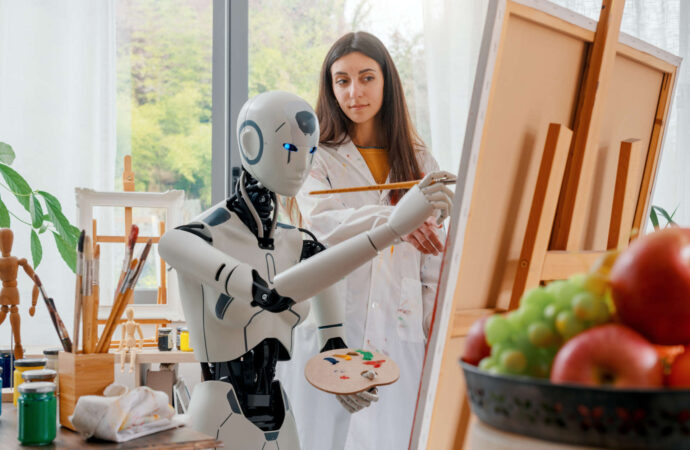Let’s be honest—since ChatGPT and other AI tools exploded onto the scene, many of us can’t imagine getting through the day without them. Whether you’re deep into coding, crafting the perfect marketing campaign, or crunching numbers, AI has quickly become a staple in our professional lives.
But as AI gets more popular, a darker question is lurking: “Is AI coming for my job?” If you’ve ever nervously Googled it —you’re definitely not alone.
Here is an important disclaimer: If you’re hoping for some comfort, this might not be the place to find it. In this article, we’re diving straight into the hard truth about the industries AI is set to disrupt.
The numbers don’t lie: AI’s role in workforce reduction
The future workforce is already at risk due to rapid advancements in technology. A global survey of C-suite executives, carried out by the Swiss staffing firm Adecco Group in partnership with Oxford Economics, revealed some startling predictions.
According to the survey, 41% of executives expect to employ fewer people over the next five years due to the increasing reliance on AI. This isn’t just speculation—it’s a reality we’re beginning to see unfold across multiple industries.
The study shows that AI, particularly advanced language models like ChatGPT-4, could impact around 40% of the total working time across different jobs.
Accenture’s report further highlights this shift, noting that 65% of the time spent on “language tasks” could be transformed into more productive activities through AI-driven augmentation and automation.
These numbers are clear: AI is going to greatly reduce the need for human workers in many jobs, leading to big changes in the job market. This will affect everything from our daily tasks at work to our career plans for the future.
But the most important question is this: Which sectors of the economy are most at risk?
Data entry and administrative tasks
One of the first job categories to feel the impact of AI is data entry and administrative tasks.
AI excels at processing and organising vast amounts of data quickly and with precision, making roles centred around data entry, document scanning, and information sorting highly vulnerable.
These tasks, which are often repetitive and rule-based, are ideal candidates for automation.
Smart software can handle data entry, organisation, and administration more efficiently than humans, reducing errors and freeing up workers to focus on more complex and challenging tasks.
Coding
The coding landscape is also experiencing a significant transformation due to AI. Tools like ChatGPT can generate fluent, syntactically correct code faster than most human programmers.
While this might be concerning for coders who specialise in producing high volumes of code, those who prioritise quality have the opportunity to incorporate AI into their workflows to boost efficiency.
AI in coding is less about replacement and more about augmentation, allowing developers to focus on more complex and creative aspects of their work.
Customer service
The customer service industry has long been ready for automation, and AI is now stepping into the spotlight.
AI-powered chatbots and robotic process automation are already streamlining customer interactions, providing quick and personalised responses without the need for human agents.
Although ChatGPT and similar tools haven’t yet reached the point where they can run an entire contact centre, they are certainly lightening the workload by automating tasks like translating inquiries or summarising customer concerns.
Legal services
The legal sector is another field where AI is quickly making its mark.
AI tools are increasingly capable of performing tasks traditionally handled by paralegals and legal assistants, such as document review, contract analysis, and legal research.
Studies suggest that AI could take over 44% of the tasks typically performed by legal assistants in the U.S. and Europe.
With AI like GPT-4 passing the Uniform Bar Examination in the 90th percentile, it’s clear that the role of AI in law is only set to grow.
Teaching
Education is not immune to the AI revolution. Teachers face new challenges, such as detecting AI-generated plagiarism or students using AI tools like ChatGPT to complete assignments.
However, AI also offers potential benefits, such as acting as a productivity tool for drafting lesson plans or generating quiz questions.
While there is concern that AI might reduce the role of teachers, the face-to-face connection in classrooms is still a crucial part of education that technology can’t completely replace.
Finance
AI is reshaping finance in many ways, from tools that track transactions and offer detailed financial advice to those that manage huge databases.
For example, Morgan Stanley uses AI-powered chatbots to streamline its operations. As AI becomes more integrated into financial services, it has the potential to improve everything from customer service to backend processes.
Yet, it also raises concerns about job security for those in traditional financial positions.
Graphic design
Generative AI is making waves in the graphic design industry, with tools like Adobe Photoshop’s Generative Fill allowing users to create photorealistic edits using simple text prompts.
Other platforms like DALL-E and Midjourney are also enabling people with no design experience to create detailed images from text descriptions.
While these tools democratise design, they also challenge professional graphic designers to adapt and find new ways to leverage AI in their creative processes.
Engineering
Engineering, especially in mechanical design, is being revolutionised by generative design—a type of AI that speeds up the computer-aided design process.
This technology allows engineers to explore numerous potential solutions to a problem, boosting innovation.
While generative design helps with ideation and optimisation, it’s not expected to replace human engineers, who are crucial for overseeing and refining these AI-generated designs.
Human Resources
Human resources (HR) is another area where AI is gaining ground. AI-powered recruiting tools can find qualified candidates, sift through resumes, and automate many tasks that recruiters typically do.
AI chatbots are also helping employees access benefits and handle self-service tasks. However, introducing AI in HR presents both opportunities and challenges, as organisations need to weigh the efficiency gains against the potential effects on their workforce.
The future of work in an AI-driven world
As AI keeps evolving, its impact on the workforce will only increase. Some jobs will get a boost from AI, allowing workers to focus on more complex tasks, while others could be completely automated.
The real challenge for both individuals and industries will be adapting to these changes. It’s about figuring out how to use AI’s strengths while keeping the human touch that’s essential in many roles.
Going forward, staying informed and proactive will be crucial for thriving in an AI-driven world.
Source: Forbes | World Economic Forum | Accenture










Leave a Comment
Your email address will not be published. Required fields are marked with *